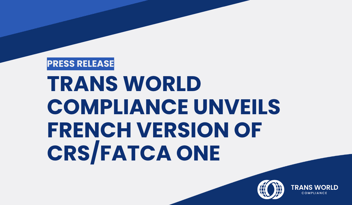Tax Authority Audits for FATCA and CRS Compliance in 2024
Most annual FATCA and CRS submissions for the 2023 reporting year due during 2024 have now been completed.
Before your Home Country Tax Authority (TA) performs its annual global exchange, it, too, needs to interrogate the data to ensure that the data is as accurate as possible.
Having just ended the marathon of annual due diligence and reporting and all the drama that comes with it, many of us may find the additional audit queries from our HCTAs daunting and stressful.
While we may feel like our TAs are public enemy number one, it is in the country’s best interest to have every stone overturned to ensure the smooth automatic exchange of information during September. Like financial institutions, the last thing the TA wants is audit queries from other jurisdictions. The consequence for the financial institutions is a range of possible penalties. Still the country could face grey or even black listing down the line if peer reviews across the various exchange jurisdictions provide less than satisfactory feedback. Grey and blacklisting lead to more stringent AML/KYC processes for financial institutions and well as taxpayers located in these jurisdictions finding it more challenging to open offshore accounts.

That said, each jurisdiction has its process of data interrogations that lead to audit queries for financial institutions. Here are some pointers I’ve picked up along the way.
British Virgin Islands (BVI)
The BVI’s go-to is to request the AEOI Policies and Procedures from the Reporting Financial Institution (RFI) and query missing Tax Identification Numbers (TINs).
The RFI’s AEOI Policies and Procedure must be ready to be emailed.
Where TINs are missing, the RFI must know the reason the TINs are not on record and provide either copies of self-certification or communication with account holders whose TINs are missing to show that the RFI has applied reasonable efforts to obtain the missing TINs.
Cayman Islands
The Cayman Islands have dialed matters up a notch.
CRS Compliance Forms have been required since 2021. The CRS Compliance Form submissions can be wildly confusing as the instructions provided by the Department of International Tax Cooperation (DITC) are unclear. Ultimately, the CRS Compliance Forms seek to interrogate the number and value of non-reportable account holders of the RFI. The form further requests certifications that proper AML procedures have been complied with and the self-certifications have been collected as required by the CRS Regulations.
The DITC has a tool that compares the number of returns submitted each year and the prior year’s submissions to the following year’s. Where entities have not been deactivated, the DITC will request missing returns, including nil returns, with the promise of penalties for those who delay.
Guernsey
Like the Cayman Islands, the Guernsey Revenue Authority also requires additional reporting in the form of Self-Certification Reporting. RFIs must submit a list of account holders for whom they do not hold self-certifications. During August, the Guernsey Revenue Authority may contact RFIs again to determine the progress of collecting outstanding self-certifications.
Isle of Man
Isle of Man Treasury reviews the reports submitted for any non-reportable jurisdiction. Where the RFI has submitted reporting on an account holder who is a tax resident in a non-reportable jurisdiction, the Treasury may pursue GDPR breach fines.
Jersey
Revenue Jersey sets the standard with its robust, detailed annual audit queries. Revenue Jersey, like the Cayman Islands, compares submissions made by the RFI year on year. Revenue Jersey then goes a few steps further and interrogates:
-
Account holders reported year on year.
-
Undocumented accounts reported year on year.
-
Number of TINs missing year on year. US TINs are queried before the global exchange takes place.
-
Classifications are queried for relevance.
-
Any indicia that looks different is queried.
-
Date of birth is a mandatory field. As the data element is mandatory for AML/KYC collection, any missing date of birth may be queried.
Switzerland
The Swiss Federal Tax Administration (FTA) is a third country that compares submissions year on year. Where submissions are found to be missing, unlike the above TAs, the FTA shares the communication via post. Penalties will apply to those RFIs who do not submit missing returns as soon as possible.
Conclusion
FATCA has been in effect since 1 July 2014, 10 years this year.
CRS has been in effect since 1 January 2016, 9 years this year.
It is safe to say that we are well in the swing of things, and expectations of compliance and accuracy are high globally. TAs have geared up their data interrogation techniques. Audit queries will become the norm unless RFIs have agile due diligence and reporting processes in place. If not, expect AML and AEOI penalties to start rolling in while your account holders could be audited for possible tax evasion.
Consider Complere Consulting’s expertise to minimize regulatory risks. With in-depth knowledge of FATCA and CRS, Complere offers tailored guidance and support throughout the audit process.
Trans World Compliance's Tax Authority Compliance Suite (TACS) automates FATCA, CRS, and other OECD data exchanges. TACS helps tax authorities streamline reporting, improve accuracy, and stay compliant with global standards, reducing the risks of audits.
By Avril Bell
Follow Complere Consulting Pty Ltd and Trans World Compliance for more content on CRS and FATCA compliance.




